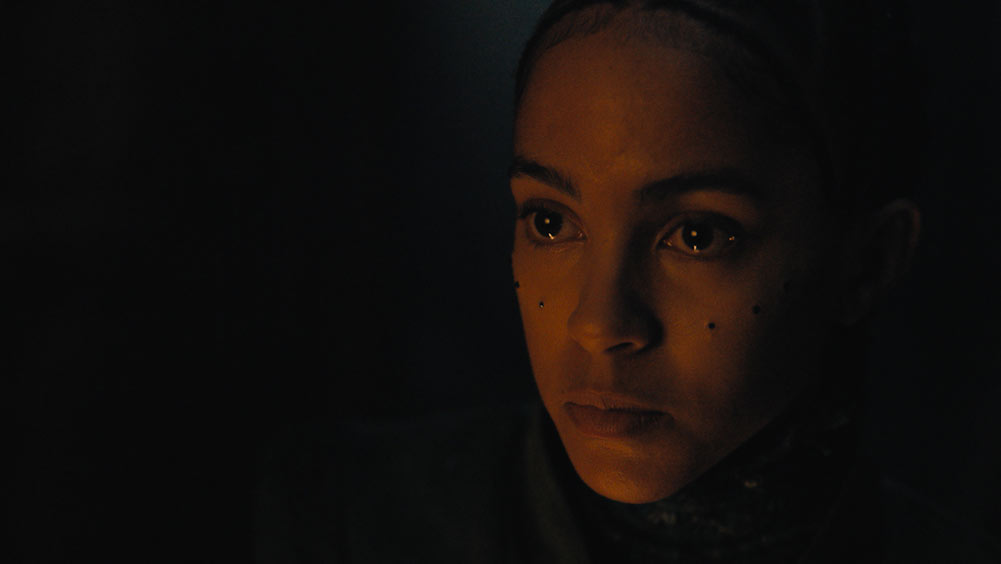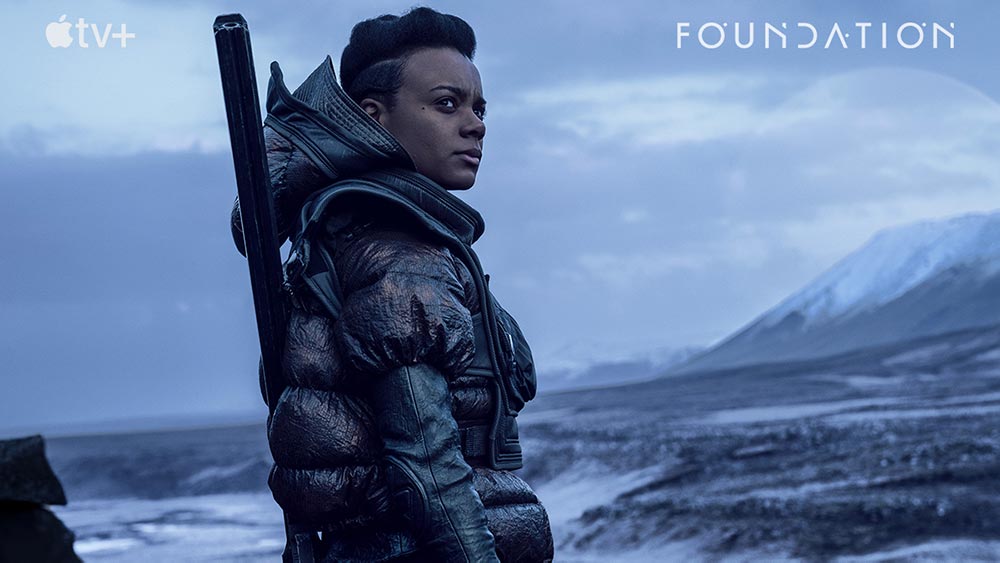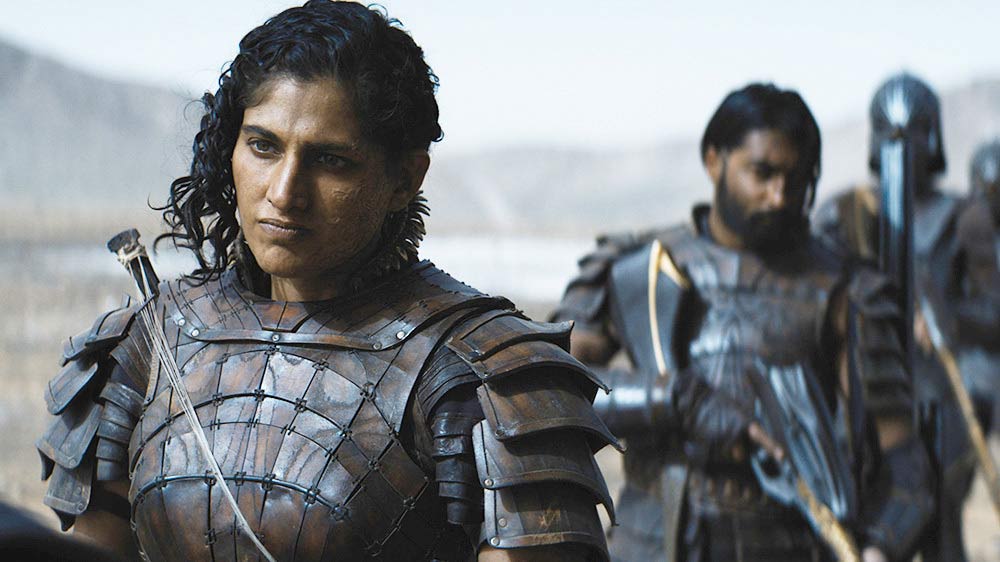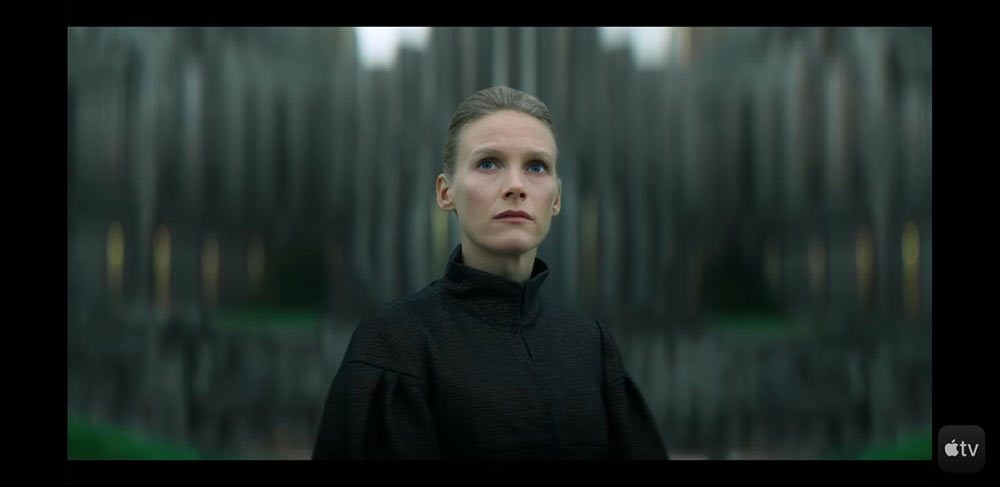*This article has spoilers for the Foundation books and TV series.
Starting in 1941, Isaac Asimov published an interrelated series of short stories in a magazine called Astounding Science Fiction. In 1951, the stories were first published in book form as the Foundation Trilogy. By 1966, this Russian-American author’s Foundation series was so popular that it beat out JRR Tolkien’s The Lord of the Rings Trilogy for the prestigious Hugo Award for the Best All-Time Series. That’s how incredible the Foundation books are considered to be among science-fiction aficionados!
But, strangely enough, this book series has never before been adapted for the screen, big or small. Because of its massive, intergalactic scale and a time period spanning a thousand years, filmmakers have avoided even picking up Foundation…until David S. Goyer and Josh Friedman decided to adapt it for Apple TV+. Starring Jared Harris, Lee Pace, Alfred Enoch and a brilliant cast, the Apple TV+ series has been a topic of discussion since its release on September 24, 2021. The reason behind this isn’t just because this is the first time Asimov’s stellar creation has been translated into a story for the screen, but also because of some changes that the creators of the show have introduced to make Foundation a better fit for the OTT world.
Without spoiling too much, yes, there are minor changes in the way the plot unfolds. A highlight of Asimov’s books was that they were science or theme-oriented, and not character-oriented—you never stayed with a character for more than one short story, so there was no need for character development until much later, when Asimov wrote the Foundation prequel books. But, for the silver screen, character arcs and emotions are what stay with you, so that’s a big difference Goyer and Friedman made for their show. The other biggie is clearly the number of gender-reversed characters on the show as compared to the books—and that’s the bigger deal for us here.
A Galaxy Without Women?
Cards on the table, this author could never finish reading the Foundation books. As a dedicated science-fiction nerd, I collected the entire series and began reading them because they’re more than just classics in the genre. They’re path-breaking and genre-defining at the same time. But halfway through Foundation and Empire, the second book in the series, I lost interest completely—and the sole reason was the complete and shocking absence of a single female character. Forget lead characters, there was barely a woman in the extreme periphery of this futuristic galactic empire.
Science-fiction, just like STEM fields in general, has been a male-dominated scene for a long time and one is unlikely to find well-rounded women characters in the 1940s and 1950s. But even Frank Herbert’s Dune, which was published in 1965, has so many powerful women that their complete absence in Asimov’s galaxy is unbelievable. Critics have argued that Asimov’s work was more about developing the ideas of the future, of science and mathematics—called Hari Seldon’s Psychohistory in the series—rather than the characters. But the fact that in a world full of mathematicians, scientists, mayors, rulers, extremists, smugglers and psychologists, not one person is defined as anything but a man, is problematic to the point of being rudely exclusive—and no, we don’t want any more of that because we’ve endured it for decades (centuries, really) and fought hard to overcome this type of bias.
And that’s precisely what the Apple TV+ show understands and appreciates. Goyer and Friedman have done a fine job of reversing the genders of several key characters in Foundation, but that’s not all they have done. They have fleshed out the characters and story arcs of these women to make them more relatable to women today. They fill the ranks of everything from scientists and mathematicians to wardens, seers and warriors. What’s more? They have made these female characters women of colour! Here are a few key women on Foundation that you must look out for and be inspired by.

The Origins Of Gaal Dornick
The book character Gaal Dornick, apart from being a man, was a mathematician from the planet Synnax who was invited by Dr Hari Seldon to join the Foundation project. In the show, Gaal (played by Lou Llobell) has the same basic story, but her arc is more well-defined. Synnax is depicted as a planet that has no place for science, where scientists, mathematicians and free thinkers are drowned alive along with books of science. Coming from such a background, Gaal is shown as a woman in STEM who is simply brilliant and at once so humane. Unlike in the books, Gaal in the show seems to be more of a running thread between the episodes, as a prospective heir to Seldon’s own brilliance and mathematical prediction of the future.

The Spirit Of Salvor Hardin
In the books, Salvor Hardin is known as one of the most prominent mayors of Terminus, the planet on which Seldon’s Foundation is established. According to the source material, there are two crises that Hardin resolves with his brilliant command of Terminus, galactic politics and simple common sense. In the show, Hardin is played by Leah Harvey, and she is shown as a woman whose destiny is still being shaped. She is a fighter and, like in the books, understands that being a scientist does not assure your survival on a planet unless you’re also politically aware and savvy enough to navigate through the problems your neighbours can throw your way. Currently, the show is in the middle of depicting the first crisis Hardin faced against the neighbouring planet of Anacreon.

The Justice Phara Keaen Demands
Phara Keaen—not a book character—is a Grand Huntress of Anacreon, and currently the main opponent of Hardin and Terminus. Played by Kubbra Sait, this character is as well fleshed out as every woman in the show, despite being a nondescript, faceless character in the books. And yet, thanks to the way Sait depicts her, Phara comes across as real and relatable. She is an extremist whose actions are fuelled by the intergenerational trauma the Empire inflicted on the people of her planet. As a warrior, she leads the armies of Anacreon, and every single fight scene of hers is worth the watch.

The Quiet Patience Of Eto Demerzel
In the books, Eto Demerzel is an alter-ego of R. Daneel Olivaw—the R. stands for Robot—and a male character to boot. Demerzel manages to become the first minister to Emperor Cleon I, and befriends Seldon. In fact, according to the prequel books, Demerzel is the inspiration behind Seldon’s Psychohistory! In the show, however, Demerzel (played by Laura Birn) is the first minister to all the Cleons in the Cleonic genetic dynasty. As far as the show suggests, Demerzel is the guide to the young Cleons or Brother Dawn, an adviser to the adult Cleons or Brother Day, and a support for the older Cleons or Brother Dusk. Her patience in dealing with the ever-changing lives of humans on the capital planet of Trantor, the vagaries of galactic politics and the temper and tantrums of the Cleons themselves is brilliant. At the same time, as the only truly immortal creature in the galaxy, you know she holds the power of memory like nobody else does.